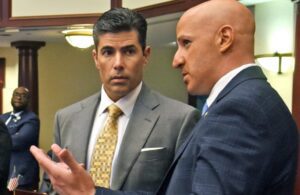State and local officials have invested $1.7 billion of the public’s money in Israel Bonds since October 7. An investigation reveals contacts between buyer and seller that experts say may cross a line.
by Spencer Woodman and Joanna Robin, reposted from The Guardian, July 25, 2024
In August 2023, an executive at Israel Bonds – an organization that sells Israeli bonds to fund that nation’s government and buttress its military – emailed the Ohio state treasurer’s office a sales pitch: could the state of Ohio buy a batch of Israeli bonds for $5 million?
In less than 40 minutes, the treasurer’s office approved the purchase, bringing Ohio’s Israeli bond purchases to a total of $35 million for that year.

The fast deal was made between parties that were on exceptionally friendly terms, according to a trove of emails and other records obtained by the International Consortium of Investigative Journalists (ICIJ).
And it was not the only matter being discussed with Israel Bonds. At the same time that the Ohio treasurer, Republican Robert Sprague, allocated millions in state funds to the bond purchases, he was also making arrangements with the bond seller’s business development team to join an exclusive guided trip to Israel, scheduled for later that year.
Six weeks after the Ohio treasurer’s $5 million purchase, Hamas launched its deadly October 7 attack, which killed nearly 1,200 people in Israel. Another 250 were taken hostage.
In the following days, there was an outpouring of public support from lawmakers at all levels of government in the United States for the country’s closest ally in the Middle East.
While Israel launched its retaliatory bombardment of the Gaza Strip – and Joe Biden shepherded billions in funding and military aid through Congress – many state and local governments showed their support through a lesser-known financial mechanism: investing in sovereign bonds issued by Israel.
Since the start of the war, US states and municipalities have bought at least $1.7 billion in Israeli bonds, with Democratic and Republican officials around the country boasting of their investments demonstrating support for an Israel at war.
This is an area of ethics where there are many potential conflicts of interest.
— Richard W. Painter of the University of Minnesota.
Israel Bonds, which is headquartered in New York, has meanwhile found itself caught up in a global political maelstrom that followed the Hamas attack and the war in Gaza. Activists have singled out Israel Bonds in demanding that corporations and institutions divest from financial instruments seen as supporting Israel’s government.
The more than 2,000 pages of emails and other records obtained by the ICIJ, largely through records requests, offer an unprecedented glimpse inside Israel Bonds’ extensive efforts to court public officials in the US while delivering highly personalized sales pitches in a stream of pro-Israel messaging. The documents show how some officials who buy these bonds have gained access to an often-glitzy world that includes gala dinners, cocktail celebrations and private meetings with top Israeli leaders and senior military officials – and how these dealings with Israel Bonds sometimes blurred the lines between private life and official business.
In a statement to the ICIJ, a spokesperson for Israel Bonds said that the bonds were a safe investment and that the group places importance on building relationships with its customers, partly to keep continuity if key decision-makers change due to elections or other reasons. “Investors usually choose to invest for a simple reason: Israeli bonds offer strong credit as well as strong and steady returns,” Nathan Miller, a spokesperson for Israel Bonds, said. “The state of Israel has never missed an interest or principal payment in almost 75 years of issuing bonds.”
When an elected official tasked with investing taxpayers’ money buys government bonds, it’s usually a dry and straightforward process with little interaction between the seller and buyer. Government officials are generally discouraged from taking actions that could be construed as creating a conflict of interest – that could cause them, for instance, to favor certain assets for any reason other than selecting the best investments available. Ethics experts say some state officials may have crossed an ethical line in their dealings with Israel Bonds.

“This is an area of ethics where there are many potential conflicts of interest,” said Richard W. Painter, a law professor at the University of Minnesota and former chief White House ethics lawyer in the George W. Bush administration. “These types of practices, the mixing up of the personal and official, seem to go well beyond what’s seen as acceptable,” Painter said, referring to actions of public officials described in this article.
Miller said that “Israel Bonds’ marketing practices and events are legitimate, appropriate and common practice” in the industry.
The ICIJ interviewed a half-dozen experts on state treasuries who described a usual investment approach in which bonds were chosen based on expected performance alone and where extensive interaction with sellers was rare.
Bill Lockyer, a former treasurer of California, said his former office bought bonds only in arms-length transactions. Early in his tenure, he said, a major bank hosted a swanky event in Napa valley. Although he attended the daytime activities, he recalled declining to accept a hotel room or attend the bank’s dinner due to ethics concerns. “I got my own motel and ate at the local Mexican restaurant. I didn’t want to violate anything.”
In an era of war and rising concerns over antisemitism in the US and abroad, Israel Bonds sees itself at the vanguard of securing the future of the Jewish state. And given the historic scale of its operations, which have raised $52 billion over more than seven decades, and the toll that the war has taken on the country’s economy, Israel Bonds’ performance could have real consequences for Israel’s future.
‘Now is the time to stand with Israel’
For decades after its launch in 1951, Israel Bonds, formally known as the Development Corporation for Israel, primarily focused on leveraging funds from the Jewish diaspora in the US to bolster the fledgling Middle Eastern state. Israeli bonds have long been pitched as gifts for celebrations such as birthdays and bar and bat mitzvahs. But the group – and its marketing strategy – has evolved, becoming an important source of government financing as it courted banks and other institutional investors, more recently including US states and municipalities.

“In some ways, the Israel Bonds program is one of the – if not the – most successful sovereign debt issuance programs in the history of the world,” said Mitu Gulati, a law professor specializing in international debt finance at the University of Virginia School of Law.
In the early weeks of the war, though, the Financial Times reported that Israel quickly borrowed billions of dollars by issuing bonds through privately negotiated deals, despite growing concerns about the bonds’ risks. Over the past year, credit rating agencies have downgraded Israeli government bonds due to growing political instability, although the bonds are still considered well within “investment grade territory,” according to Bloomberg.
But many US state and local governments were undeterred by the turbulence. On October 11, Sprague announced Ohio’s plan to invest an additional $20 million in Israeli bonds. “Now is the time to stand with Israel,” he said in a statement.
Joseph Abruzzo, the Democratic chief financial officer of Palm Beach county, one of Florida’s wealthiest counties, announced an additional $160m investment in Israeli bonds in October alone.
On March 12, 2024, the Palm Beach county board of commissioners approved Abruzzo’s request to lift the cap on the investments from 10% to 15% of the county’s portfolio. Two weeks later, Abruzzo claimed, in a press conference, the county’s new title of “world’s largest investor in Israel Bonds,” which accounted for roughly $700 million of its $4.67 billion portfolio.
In May, three Palm Beach county residents – all US citizens with Palestinian heritage – sued Abruzzo for allegedly breaching his fiduciary duty to taxpayers and for investing for “social, ideological and political reasons,” which Florida banned under a 2023 law, according to court documents. One of the plaintiffs said in the complaint that the Israel Defense Forces had killed 37 of his family members since October 7, 2023.
“We expect the frivolous case brought against me in my capacity as clerk will be quickly dismissed with prejudice,” Abruzzo, who is also clerk of the circuit court, said.

In December 2023, both Sprague and Abruzzo joined Israel Bonds’ newly formed government, industry and financial services leadership group, alongside Illinois’s treasurer, a Democrat, and treasurers from Pennsylvania and Oklahoma – both Republicans. The purpose of the group was to help Israel Bonds strengthen ties with government and other institutional investors in the US, according to media reports. Sprague, the Ohio treasurer, was named chair.
High-level visits and access
The itinerary for Sprague’s planned October 2023 trip to Israel reads like a luxury vacation mixed with an official state visit. In a statement to the ICIJ, Sprague’s office said he had planned to pay for the Israel trip with personal funds, some of which he had already spent before the trip was canceled after Hamas’ October 7, 2023 attack on Israel.
A spokesperson for Sprague said there was nothing unusual or inappropriate about his relationship with Israel Bonds and that every Ohio treasurer since 1993 had invested in Israeli bonds, which have “consistently proven to be a strong and reliable investment for the state portfolio.” Since 2019, Sprague has bought $357.5 million worth of Israeli bonds on behalf of Ohio.
The trip to Israel was to begin with Sprague checking into a five-star Jerusalem hotel before being shuttled to a gala dinner at a subterranean venue with vaulted stone ceilings. The itinerary for the days afterward included a trip to the City of David, the controversial archaeological site, for “an exclusive tour of places not yet open to the public, including groundbreaking archeological artifacts.”
This morning, I announced plans to purchase $20 million in five-year, fixed-rate @IsraelBonds.
Read more: https://t.co/RWIkzJlns8 pic.twitter.com/NAdh4yYAnk
— Treasurer Robert Sprague (@OhioTreasurer) October 11, 2023
The itinerary also included meetings with Israeli politicians, a wine tasting at an Israeli vineyard, exclusive tours of two Israeli military bases and a private, after-hours tour of Tel Aviv’s Museum of the Jewish People to see the earliest copy of the Hebrew Bible. On the final day of the trip, the itinerary listed a visit to Israel’s presidential residence for a meeting with the Israeli president, Isaac Herzog.
In a statement, Miller, the spokesperson for Israel Bonds, said that only one public official – presumably Sprague – had registered for the ultimately canceled 2023 trip, and that the official planned to pay for the trip himself at the same rate as other attendees. No US public officials have attended an Israel Bonds trip since 2019, Miller said. He added that Israel Bonds “has frequently facilitated missions to Israel for our leadership and investors” and called the trips “substantive educational opportunities for our investors to learn more about the financial health and economy of the country that they have invested in.”
Sprague listed a personal email address on the registration form for the bond seller’s trip to Israel, but his Ohio treasurer’s office email account was used for at least some communications around the planned trip.
This wasn’t the first time Israel Bonds had helped plan Sprague’s travel. In March 2023, Israel Bonds hosted a conference in Washington DC to commemorate the 75th anniversary of Israel’s founding. In an email message to Sprague’s office, a sales executive for Israel Bonds said he had reserved a hotel room for Sprague at the four-star Grand Hyatt.

The Washington event featured a cocktail reception, dinner and a Q&A with Sprague and the Illinois treasurer, Michael Frerichs, for which Israel Bonds provided Sprague questions in advance. Israel Bonds also offered Sprague and Frerichs a private meeting with Israel’s finance minister at the event, according to Israel Bonds emails to Sprague. Frerichs did not respond to the ICIJ’s questions about the potential meeting, and a spokesperson for Sprague said that it did not take place.
Three months later, Sprague’s office – the Ohio treasurer’s office – reimbursed Israel Bonds $727 for his hotel and meal expenses at the event.
Late last year, Sprague traveled to Florida, where he attended an Israel Bonds gala dinner in Palm Beach to present an award honoring that state’s chief financial officer, Jimmy Patronis, for his support of Israel Bonds, including the state’s major bond purchases.
A spokesperson for Sprague said the trip “included work not for state business and that no public funds were used in paying for the trip.” Instead, Sprague used campaign funds to pay for “travel expenses and meals related to the trip,” the spokesperson said.
Sprague was already serving his second term as treasurer, and was ineligible to run for a third given term limits on his position. His office did not answer questions about what campaign activity took place in Florida, but noted that the term limit did not preclude him from running for a different office. Sprague’s campaign told the ICIJ that he attended political meetings in Florida without providing further details.
Conflicts of interest are ubiquitous in public life … If there is a conflict suspected, then the public is owed an account.
— Archon Fung of Harvard University’s Kennedy School of Government.
Ohio’s ethics law forbids public officials from taking substantial gifts from an “improper source,” including from any person or organization “seeking to do business with the agency.” Things of substantial value, according to the website, include lavish meals, entertainment activities and travel to exotic locations. Sprague’s 2023 financial disclosure form lists nothing related to Israel Bonds.
The office of the Illinois treasurer, Michael Frerichs, did not respond to the ICIJ’s repeated requests for comment, which included questions about who paid for his hotel and dining costs at the March 2023 Israel Bonds conference in Washington. (Illinois ethics laws forbid a public official from accepting gifts of more than $100 total in a calendar year from anyone who does business with the state.)
Archon Fung, a professor focusing on democratic governance at Harvard University’s Kennedy School of Government, said that transparency is key for officials, who naturally face a variety of potential ethical pitfalls. “Conflicts of interest are ubiquitous in public life,” Fung said. “For somebody in a public role, they have to explain how they are managing these issues. If there is a conflict suspected, then the public is owed an account.”
Israel Bonds said it paid the expenses for speakers at the Washington event, and that “expenses were modest and we did not ask our speakers for reimbursement.”
“Just like any other business, it is common practice for broker dealers to host seminars, meetings and conferences, during which clients and potential clients attend to discuss issues of interest to them,” Miller, the Israel Bonds spokesperson, said in a statement. “We invite a variety of speakers to present, including elected officials, and often pay for housing and transportation for those speakers who are coming in from far away.”
Florida’s growing commitment
Few states, if any, have formed the kind of partnership with Israel Bonds that Florida has. The Sunshine state has a treasury holding more than a quarter-billion dollars worth of the bonds. As the state’s chief financial officer, Patronis, who has led a major drive to invest Florida’s money in Israeli bonds, has been recognized by Israel Bonds several times in recent years.
“CFO Patronis is committed to providing the best return on investment for taxpayers’ dollars,” Devin Galetta, a spokesperson for Patronis, told the ICIJ in an email, adding that four Florida state treasurers had purchased Israeli bonds. “Since 2001, Florida has earned approximately $29 million in interest from state of Israel bonds.”
In 2018, after Patronis began dramatically increasing the state’s holdings of Israeli bonds, the bond seller honored him at a celebration during which he was presented a plaque by Israel Defense Force Maj Gen Mickey Edelstein, then the nation’s military attache to the United States.

The following year, in 2019, Patronis went on a trip to Israel that was reported by the Tampa Bay Times to be partly sponsored by Israel Bonds, which said it hosted a meal for the delegation. Patronis and a delegation of Florida politicians and business people were joined on the trip by two Israel Bonds executives, according to an official itinerary of the trip.
In 2020, Israel Bonds held a celebration in which Patronis was honored for promoting state legislation that enshrined a commitment to continue buying Israeli bonds. In 2022, Israel Bonds hosted Patronis as a special guest at its annual Prime Minister’s Circle Gala in Boca Raton. And last year, the bond seller made Patronis the main attraction at the same gala event, presenting him with a top honor called the Israel Bonds Leadership award. This was the same December event that Sprague attended.
In response to the ICIJ’s questions about who paid for Patronis’s costs around Israel Bonds events, Galetta responded only that “all appropriate statutory requirements have been met.”
Warnings of risk
Last year, Democracy for the Arab World Now, or Dawn, a non-profit organization that has accused Israel of human rights violations, submitted a complaint to the US Department of Justice alleging that Israel Bonds appeared to be violating a federal law designed to keep tabs on foreign influence operations in the US. The complaint urged the justice department to investigate whether Israel Bonds broke the law by not registering as a foreign agent.
Miller called Dawn’s letter “false and defamatory” and said Israel Bonds “is not a foreign agent, and never has been.”
Since October 7, Israel Bonds has raised a staggering $3 billion worldwide. At the same time, the group has attracted new attention from activists seeking divestments from Israel. In May, the advocacy group Jewish Voice for Peace protested outside Israel Bonds’ Philadelphia offices, shutting down city streets and demanding government offices withdraw investments in Israel.
As previously reported by the Guardian, many of the US states that answered the call to buy Israeli bonds are the same ones that have railed loudly against investment strategies based on social and environmental issues, such as the climate crisis. The Guardian found that the majority of state financial officials who invested millions in Israeli bonds in the first month of the war belonged to a conservative group that is now lobbying to keep “the left” out of state treasuries.
In mid-2021, Thomas Clancy, the then chief investment officer of Pennsylvania’s treasurer, Stacy Garrity, cautioned that Israeli bonds could be a risky investment for the state, according to emails obtained by the ICIJ. Clancy emphasized Israel’s political instability and the country being “frequently involved in military violence.” He also noted that the bonds are not traded on the open market – meaning, regardless of headwinds the nation may face, buyers are stuck with the bonds until they pay out. He proposed “investing in more liquid securities, with fewer risks to the investment capital.”
His advice was not followed. Erik Arneson, a spokesperson for Pennsylvania’s treasury department, pointed out in an email to the ICIJ that the chief investment officer “is one member of the Pennsylvania treasury department’s investment committee” and that “in this case, the other members of the investment committee did not agree with the former CIO’s view on Israel Bonds”. Arneson also emphasized that Israel Bonds has never defaulted on its payments.
On October 10, 2023, Pennsylvania’s new chief investment officer conveyed an opportunity from Israel Bonds for the state to make an additional investment “given everything taking place.” It took Garrity just an hour to confirm that she would “love” to temporarily increase the state’s investment in Israel bonds by $10 million. By October 12, she publicly pledged to double that amount to $20 million worth of bonds.
This story was co-published with the International Consortium of Investigative Journalists.
Spencer Woodman is a reporter for International Consortium of Investigative Journalists.
Joanna Robin is digital editor for International Consortium of Investigative Journalists.
How one public official made Palm Beach County the largest holder of Israel bonds

Joseph Abruzzo can’t seem to get enough Israel bonds
by Asaf Elia-Shalev, reposted from The Jewish Telegraph Agency, May 1, 2024
The government official representing Palm Beach County, Florida, has invested $700 million of local taxpayer money in bonds that are helping the Israeli government finance its war against Hamas since Oct. 7.
At 15% of the county’s investment portfolio, Abruzzo has reached the maximum he is legally allowed to buy, per county policy. The total represents about a quarter of all Israel bonds sold since the war began, making Palm Beach County, which has a large Jewish population, the single biggest holder of Israel bonds in the world.
Abruzzo, who is not Jewish but has Jewish relatives, says his motivations are not ideological and that he’s hewing to state law and county policy requiring that he focus on safeguarding public money. But he also said the investment strategy happens to align with his support for Israel.
“I am proud to stand with what I consider our greatest ally in the entire world — Israel,” Abruzzo said in an interview. “With that said, these are incredibly safe investments. They’re making an incredible return for county taxpayers and it made perfect sense for us from a fiduciary standpoint.”
Palm Beach County is unique in how much of its financial portfolio is invested in Israel bonds, but Abruzzo’s words echo the reasoning of the growing number of state and local governments across the United States that have invested in the bonds in recent months.
The Israel Bonds organization, an arm of the Israeli government, announced earlier this month that it has sold more than $3 billion in bonds since Oct. 7, nearly three times its normal annual total, as the country navigates economic turmoil from the war. The buyers include individuals and financial institutions, but most of the sum, $1.7 billion, was purchased on behalf of taxpayers by government investment officers like Abruzzo, marking a departure from Israel Bonds’ traditional pitch as a chance for individual Jews in the Diaspora to invest in Israel’s development.
“We have seen state local governments all over the country invest in Israel bonds for some time now but we have seen a lot of jurisdictions invest for the first time or increase their holdings in Israel bonds particularly since Oct. 7,” said Justin Marlowe, a research professor at in the University of Chicago Harris School of Public Policy and director of the school’s Center for Municipal Finance. “In some cases, we’ve had governments come right out and say that they’re increasing their investments as a statement of solidarity with Israel.”
At a time when anti-Israel protesters on college campuses are calling for their schools to divest from Israel, and for greater transparency into their school’s investment portfolio, the bonds represent a massive swath of Israel investments that are wide open to public review — though it’s not clear how much scrutiny they are drawing. No members of the public spoke for or against the strategy at a March meeting about Palm Beach County’s buying spree, according to video from the meeting.
Experts say the trend of public spending on Israel bonds is notable because state and local governments can’t take the same risks as ordinary investors. Governments have to be more careful because the money they are investing was collected from taxpayers and it must eventually be available to be spent on public needs, explained Daniel Bergstresser, a Brandeis University professor specializing in municipal finance.
“So investing these funds in safe assets is a very high priority,” Bergstresser said. “The bills must be paid.”
For most people managing public sector money, the situation has traditionally meant that they’re going to steer clear of any sort of investment in a sovereign entity, according to Marlowe.
“There are very few sovereign entities that are triple-A rated and can be considered truly risk free the way that U.S. Treasury Bonds can,” he said.
35 state and local governments invested in the (Israel) bonds . . . the list includes Florida, New York, Alabama, Arizona, Ohio, Illinois, Texas, Oklahoma, Georgia, Nevada, Louisiana, South Carolina, Pennsylvania and Indiana…the Florida counties of Broward, Palm Beach and Miami-Dade, the cities of Miami Beach and Boca Raton, and Franklin County, Ohio.
In Israel’s case, the political instability and effect of the war on Israel’s economy have led global credit agencies to downgrade or attach warnings to the country’s ratings, which theoretically affects the government’s ability to borrow money.
And not all states allow local cities and counties to invest abroad. Florida passed a law to permit local Israel bond investments in 2008.
“A state allowing it is a reflection of the state’s priorities and whether local officials choose to take advantage is a reflection of their priorities,” Marlowe said. “It’s clearly a policy statement on the part of government.”
In total, 35 state and local governments invested in the bonds after Oct. 7. Not all have disclosed their investments but the list includes Florida, New York, Alabama, Arizona, Ohio, Illinois, Texas, Oklahoma, Georgia, Nevada, Louisiana, South Carolina, Pennsylvania and Indiana as well as the Florida counties of Broward, Palm Beach and Miami-Dade, the cities of Miami Beach and Boca Raton, and Franklin County, Ohio, according to the Bond Buyer.
The trend cuts across party lines.
“This is a bipartisan effort. I’m a Republican, but we’ve got a great Treasurer in Franklin County’s Cheryl Brooks Sullivan and she’s a Democrat,” said Ohio state treasurer Robert Sprague in a recent virtual meeting of government investors convened by Israel Bonds, according to the Bond Buyer.
Abruzzo holds the elected office of clerk of the circuit court and comptroller for Palm Beach County, an area with a large and growing Jewish population. People living in Jewish households make up about 15-20% of the county, according to Brandeis University demographic studies released by the county’s two Jewish federations in 2018.
Before serving at the county level, Abruzzo, a Democrat, was a member of the Florida House Representatives and Senate. He sponsored bills to support Holocaust survivors and recognize the 70th anniversary of Israel’s founding in 2018.
Abruzzo told JTA he was a quarter Jewish before clarifying he was referring to the results of a genetic ancestry test. He added that his stepmother is Jewish and he grew up in a mixed Italian and Jewish household, with step-brothers who had bar mitzvahs.
“I like to say that one of my grandmothers made the best tomato soup in the world and my stepmother made the best matzo ball soup in the world,” Abruzzo said. “I’m very familiar with Israel and Jewish heritage.”
He began investing in Israel bonds long before the current war. During his first year in office in Palm Beach, he convinced the Board of County Commissioners to double how much he was allowed to invest in Israel bonds from 5% to 10% of the county’s portfolio. But at the time, there were only so many bonds on the market and he couldn’t reach anywhere near the cap.
As Israel went to war and saw its economy contract, the government decided to offer more bonds.
“Fast forward to Oct. 7 and a day or two after that horrific event, I was able to speak with [local Israel Bonds representative] Mark Ruben and we purchased $25 million in bonds,” Abruzzo said. “We got very good rates and were excited about it. We then did the largest single-day purchase, which was $135 million.”
But even that wasn’t enough.
In March, he asked the county board to increase the cap again. In making his case, he pointed out that the county is set to earn $83 million in interest on the bonds, part of what official data shows is dramatically higher performance for the county’s financial portfolio since he took office in 2021.
The board voted unanimously to increase his cap to 15%, which comes out to about $700 million of the $4.7 billion in county coffers.
According to experts, the situation in Palm Beach County is highly unusual.
“I’m not aware of any other jurisdiction that has 15% of their holdings in one type of investment,” Marlowe of the University of Chicago said. “That’s not necessarily good or bad. It’s a decision. It’s a policy choice that they’re making. But it does represent a much greater concentration of risk in any portfolio for a public entity than I’ve seen in a long time.”
Bergstresser, of Brandeis University, said he believes the investment strategy is unusual to the point of being possibly unwise.
“Such a large allocation to one foreign issuer is arguably inconsistent with standard advice about portfolio diversification, particularly when avoiding severe losses is as high of a priority as it is in this situation,” Bergstresser said. “Sovereign issuers do sometimes default on bonds that they have issued. If the State of Israel were to default on these bonds, then Palm Beach County would have to find a way to pay its bills without money that it had counted on being available.”
Abruzzo is up for reelection in November, but with less than two months until the filing deadline, no one else has declared their candidacy, meaning that he is currently running unopposed.
Abruzzo said political calculations are not behind his Israel Bonds investments.
“Every decision was dollars and cents, and financial safety,” he said. “This has nothing to do about an election or personal motives. It was not done for political gain.”
But he did weigh in on a political debate roiling the United States and deepening divides within his party over Israel’s war with Hamas in Gaza. With the White House growing increasingly impatient with the Israeli military’s conduct and the left flank of the Democratic Party accusing Israel of genocide, Abruzzo’s stance reflects a staunchly pro-Israel sentiment that’s still widespread in both parties. He rejected calls for Israel to show more restraint.
“A lot has been said about Israel, especially in the far-left circles of my party, but if what happened in Israel on Oct. 7 happened here in America, the country that was harboring the terrorists would look like the moon’s surface,” Abruzzo said.
In total, Israel’s borrowing, including Israel bonds and other financial vehicles, doubled in 2023 to $43 billion. Meanwhile, billions in charitable donations have also flowed in to support Israeli civilians and soldiers.
The successful fundraising drive for Israel Bonds comes after the organization in March last year alienated some American Jews by inviting Bezalel Smotrich, Israel’s far-right finance minister, to speak at its conference amid massive protests by Israelis against their government.
Despite Israel’s credit downgrades, Israel Bonds president and CEO Dani Naveh said prospective bond buyers have not expressed such concerns to him. He said they should rest assured that Israel has never defaulted on its bonds, despite past military crises and regardless of who was in power.
“The state has always kept its obligation, paying its debts completely on time,” Nave said in an interview. “It’s also important to mention that if you take a look at previous security crises, the Israeli economy’s resilience was very strong and I’m optimistic that it will be the case this time as well.”
Asaf Elia-Shalev is a senior reporter with Jewish Telegraph Agency.
RELATED ARTICLES:
- Top Pentagon Officer Said Politicians Get ‘Very Rich’ by Supporting Israel.
- Supporting Israel Is Big Business in the U.S. for Israel partisans.
- Israel’s covert info bots targeting America met with hypocritical silence.
- Shadowy Israeli App Turns Jewish Americans Into Foot Soldiers In Online War.
- Israel Secretly Targets U.S. Lawmakers With Influence Campaign on Gaza War.
- VIDEO — Rep. Thomas Massie: Every congressperson has an AIPAC babysitter.
- Israeli documents show expansive government effort to shape US discourse around Gaza war.
- VIDEO — Col. Douglas MacGregor: US is under the control of Israel, likens Gaza to Warsaw Ghetto.





